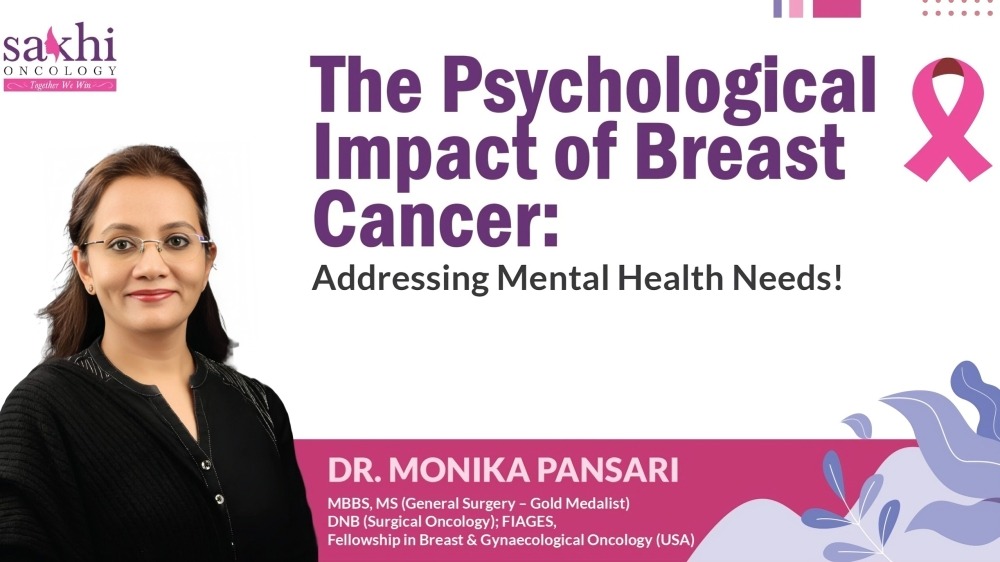Monika Pansari, Senior Consultant Surgical Oncologist at the Fortis Hospital, shared a post on LinkedIn:
“Breast cancer is not just a physical battle-it is an emotional and psychological journey that affects the well-being of patients, survivors, and their families.
A diagnosis of breast cancer brings with it a wave of emotions, ranging from fear and anxiety to grief and uncertainty about the future. While medical advancements continue to improve treatment outcomes, addressing the mental health needs of patients is equally critical for holistic healing.
Understanding the Emotional Toll
A breast cancer diagnosis often triggers a spectrum of emotions:
Shock and Denial: Many patients struggle to process the reality of their diagnosis, often feeling overwhelmed and numb.
Anxiety and Fear: Concerns about treatment side effects, recurrence, and mortality can lead to heightened anxiety.
Depression and Sadness: The changes in body image, hair loss, and fatigue can contribute to feelings of low self-worth and sadness.
Guilt and Isolation: Patients may feel guilty for the burden their illness places on loved ones, leading to emotional withdrawal.
The Role of Mental Health Support
Addressing the psychological impact of breast cancer is essential for better treatment adherence, quality of life, and overall recovery. Some key approaches include:
- Psychological Counseling and Therapy
Professional counseling, including cognitive behavioral therapy (CBT), can help patients navigate the emotional challenges of their journey. Therapists provide coping strategies, emotional resilience training, and a safe space for expressing fears and anxieties.
- Support Groups and Community Networks
Connecting with other breast cancer patients and survivors can be incredibly comforting. Support groups foster a sense of belonging, allowing individuals to share experiences, advice, and encouragement. Many hospitals and NGOs offer peer support programs for this purpose.
- Mindfulness and Stress Management Techniques
Practices like meditation, yoga, and deep breathing exercises help reduce stress and promote emotional well-being. Mindfulness techniques enable patients to stay present, reducing the fear of the unknown.
- Encouraging Open Communication
It is important for patients to talk openly with their loved ones, doctors, and counselors about their fears and emotional state. Encouraging honest conversations helps in reducing stigma around mental health concerns and ensures they receive the necessary support.
- Addressing Body Image and Self-Esteem Concerns
Breast cancer treatments often involve physical changes, including mastectomy, hair loss, or weight fluctuations. Providing resources on body positivity, access to reconstructive surgery, and support from cosmetic professionals can empower women to feel confident and reclaim their self-esteem.
Supporting Mental Health Beyond Treatment
The psychological impact of breast cancer doesn’t end after treatment. Survivors often face “survivor’s guilt,” fear of recurrence, and post-traumatic stress. Continued mental health care, regular screenings, and a healthy lifestyle can support long-term emotional well-being.
As oncologists, caregivers, and loved ones, it is our responsibility to recognize that healing is not just about curing the body—it is about nurturing the mind and soul. By integrating mental health care into cancer treatment, we can ensure that every patient walks their journey with strength, hope, and dignity.
Final Thoughts
If you or someone you know is battling breast cancer, remember: you are not alone. Seeking help for emotional well-being is just as important as medical treatment. Together, through compassion and care, we can create a support system that truly heals from within.
At Sakhi Support Group, we believe in the power of community and shared experiences. Our group provides a safe and nurturing environment for breast cancer patients and survivors to connect, share, and support each other. If you or a loved one needs emotional support, reach out to Sakhi Oncology and be a part of a community that understands and uplifts.”
She shared her own recent post on LinkedIn, adding:
“Breast cancer affects more than just the body-it deeply impacts emotional and mental well-being.
In my latest blog, I explore the psychological journey of patients and survivors, and the critical role of mental health support in healing.Read how counseling, community, and compassion can transform care beyond the diagnosis.”
More post featuring Monika Pansari on OncoDaily.


